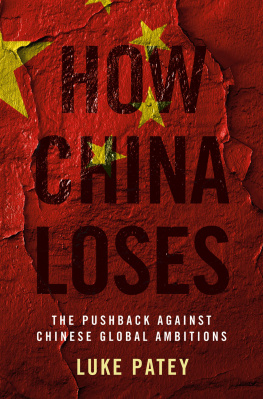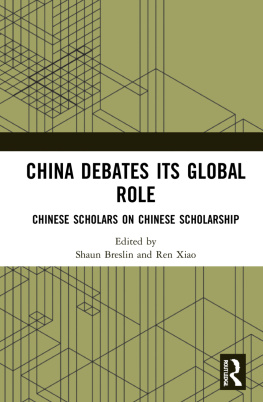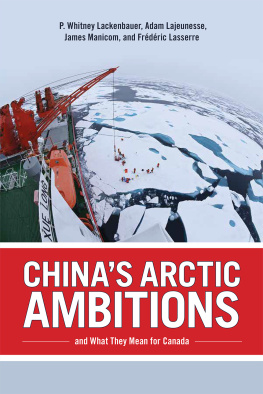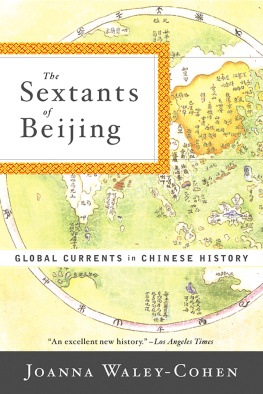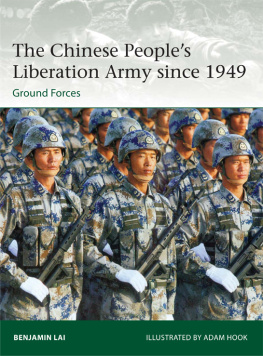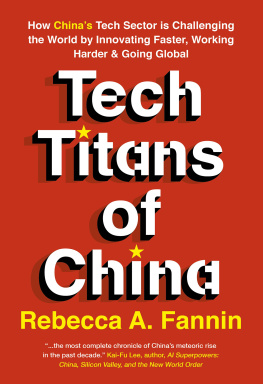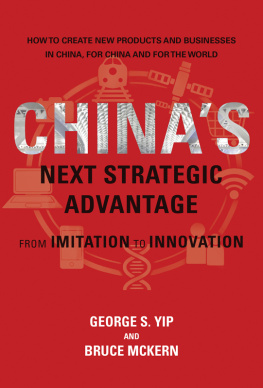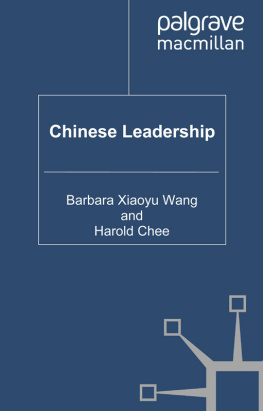Luke Patey - How China Loses: The Pushback Against Chinese Global Ambitions
Here you can read online Luke Patey - How China Loses: The Pushback Against Chinese Global Ambitions full text of the book (entire story) in english for free. Download pdf and epub, get meaning, cover and reviews about this ebook. year: 2020, publisher: Oxford University Press, genre: Politics. Description of the work, (preface) as well as reviews are available. Best literature library LitArk.com created for fans of good reading and offers a wide selection of genres:
Romance novel
Science fiction
Adventure
Detective
Science
History
Home and family
Prose
Art
Politics
Computer
Non-fiction
Religion
Business
Children
Humor
Choose a favorite category and find really read worthwhile books. Enjoy immersion in the world of imagination, feel the emotions of the characters or learn something new for yourself, make an fascinating discovery.
- Book:How China Loses: The Pushback Against Chinese Global Ambitions
- Author:
- Publisher:Oxford University Press
- Genre:
- Year:2020
- Rating:4 / 5
- Favourites:Add to favourites
- Your mark:
- 80
- 1
- 2
- 3
- 4
- 5
How China Loses: The Pushback Against Chinese Global Ambitions: summary, description and annotation
We offer to read an annotation, description, summary or preface (depends on what the author of the book "How China Loses: The Pushback Against Chinese Global Ambitions" wrote himself). If you haven't found the necessary information about the book — write in the comments, we will try to find it.
Luke Patey: author's other books
Who wrote How China Loses: The Pushback Against Chinese Global Ambitions? Find out the surname, the name of the author of the book and a list of all author's works by series.
How China Loses: The Pushback Against Chinese Global Ambitions — read online for free the complete book (whole text) full work
Below is the text of the book, divided by pages. System saving the place of the last page read, allows you to conveniently read the book "How China Loses: The Pushback Against Chinese Global Ambitions" online for free, without having to search again every time where you left off. Put a bookmark, and you can go to the page where you finished reading at any time.
Font size:
Interval:
Bookmark:


Oxford University Press is a department of the University of Oxford. It furthers the Universitys objective of excellence in research, scholarship, and education by publishing worldwide. Oxford is a registered trade mark of Oxford University Press in the UK and certain other countries.
Published in the United States of America by Oxford University Press
198 Madison Avenue, New York, NY 10016, United States of America.
Luke Patey 2021
All rights reserved. No part of this publication may be reproduced, stored in a retrieval system, or transmitted, in any form or by any means, without the prior permission in writing of Oxford University Press, or as expressly permitted by law, by license, or under terms agreed with the appropriate reproduction rights organization. Inquiries concerning reproduction outside the scope of the above should be sent to the Rights Department, Oxford University Press, at the address above.
You must not circulate this work in any other form and you must impose this same condition on any acquirer.
Library of Congress Cataloging-in-Publication Data
Names: Patey, Luke A., author.
Title: How China loses : the pushback against Chinese global ambitions / Luke Patey.
Description: New York : Oxford University Press, 2021. |
Includes bibliographical references and index.
Identifiers: LCCN 2020023555 (print) | LCCN 2020023556 (ebook) |
ISBN 9780190061081 (hardback) | ISBN 9780190061104 (epub) | ISBN 9780190061111
Subjects: LCSH: ChinaForeign relations21st century. |
ChinaForeign economic relations21st century. |
ChinaMilitary policy. | World politics21st century.
Classification: LCC JZ1734 .P37 2021 (print) | LCC JZ1734 (ebook) |
DDC 303.48/251dc23
LC record available at https://lccn.loc.gov/2020023555
LC ebook record available at https://lccn.loc.gov/2020023556
To Lilian Mattar Patey,
for showing her sons what courage looks like.
Nothing discloses real character like the use of power. It is easy for the weak to be gentle. Most people can bear adversity. But if you wish to know what a man really is, give him power. This is the supreme test.
Robert Green Ingersoll, American writer and orator, 1883
For the five years that I spent intermittently traveling and doing research for this book, I was met with openness and generosity from a host of researchers, government officials, civil society activists, and business managers and executives around the world. Undoubtedly some will disagree with my arguments and conclusions, but their willingness to meet, debate, and share their insight and experiences was essential in helping me carry out this work. This dialogue between friends and colleagues on what were generally sensitive issues in their respective countries provides me with confidence that we can overcome the current tensions and troubles that stand between China and the world. In the years ahead, it is necessary to remain open to arguments that may unsettle our established perspectives if we are to avoid escalation of present-day hostilities.
Research for this book took me to East Africa, South America, East Asia, and around Western Europe. This lengthy travel demanded time and financial support. I was lucky to have both and much more from the Danish Institute for International Studies. I know of no better place in the world to carry out such independent work. For over a decade, Ive benefited from working at an institute that maintains a rare combination of academic scholars and policy thinkers across foreign policy, defense and security, and development issues. Since the importance of China to all of these research areas is now clear, despite few working specifically on China, I gained much from discussions, support, and feedback from my current and former colleagues. These included Peter Alexander Albrecht, Louise Riis Andersen, Cecilie Felicia Stokholm Banke, Rasmus Alenius Boserup, Adam Moe Fejerskov, Kristian Fischer, Stefano Guzzini, Matthew Fallon Hinds, Johannes Lang, Jessica Larsen, Lars Kristian Mathiesen, Mikkel Runge Olesen, Jairo Munive Rincon, Frederik Rosn, Peer Schouten, Ida Marie Vammen, and Lars Vissing. I also appreciate the research and translation assistance I received from Boukje Boerstra, Kirstine Lund Christiansen, Nina Theodora Heuser, and Cynthia Murillo. Each went above and beyond in diving into specific research queries and sharpening up my work.
Sara Gro Vagtholm Srensen deserves special thanks for designing the illustrative maps for each chapter. The book spans much of the world. Mapping it was meticulous work. For each illustration the focus is on the countries and areas covered in the book. These should not be considered official in any way. Rather they are meant to present readers with a basic geographical visual to situate themselves within the content of each chapter. Countries, cities, disputed borders, and other important distinctions that may not be relevant to the books focus have been left out in many places.
This book started where my last one left off. My visit to South Sudan came shortly before political tensions boiled over into a long and devastating civil war. With hope that the worst is now behind the worlds youngest country, Im thankful to Elizabeth James Bol, Nick Champion, Brian DSilva, Tut Gatwech, Ilya Gridneff, Francois Henepin, Peter Justin, Francis Mila, Leben Moro, James Ninrew, Henry Odwar, Qian Fengzhang, John Ryle, Kathelijne Schkenel, Egbert Wesselink, Philip Winter, Zhang Hui, and Zhang Yi.
In Argentina, I discovered new research pastures. My warm reception there began with meeting University of Rosario professor Eduardo Oviedo at the Caf de los Angelitos in central Buenos Aires. With framed black-and-white photos of Carlos Gardel, Osvaldo Pugliese, and other famous Argentine singers and performers looking down on us, Oviedo not only went through the history of Argentinas relations with China, but also exemplified the hospitality I received in the country. Everyone I met was not only willing to sacrifice their time and speak at length but also connected me with their respective networks. Particular thanks go to Gustavo Cardozo, Sergio Cesarin, Gustavo Alejandro Girado, Andres Lopez, Grete Sillasen, Monica Ynakiew, and Yung Lin.
In Japan, I benefited greatly from wisdom and guidance availed on me by Miwa Hirono, Tetsuo Kotani, Masayuki Masuda, Jane Nakano, Yoshiji Nogami, Iwao Okamoto, Tomohiko Satake, Kiyoyuki Seguchi, Akio Takahara, Aki Tonami, Michito Tsuruoko, Noboru Yamaguchi, and Anthony Yazaki. In Western Europe, I am grateful to Thorsten Benner, Ana Luisa Brito, Mikko Huotari, Ellen Margrethe Lj, Angela Stanzel, Luis Villalobos, and Zhang Jiyu. In China, I learned much from discussions with Guo Cunhai, Lucy Hornby, Jin Ling, Wang Suolao, Wu Hongying, and Xu Weizhong. There have also been many people, particularly in business and diplomatic circles, who while asking to remain unnamed, made invaluable contributions to this book.
There are a number of friends and colleagues outside my home institution, and several helpful reviewers to the book, who took the time to read over selected draft chapters. Daniel Large and Ricardo Soares de Oliveira were sounding boards for early ideas and offered excellent advice throughout. I also owe much gratitude to Adnan Aamir, Akiko Fukushima, Jonathan Hillman, Fermn Koop, Rohan Mukherjee, Juan Uriburu Quintana, Shutaro Sano, and Harry Verhoeven. They each saved me from mistakes, pointed out weaknesses, and encouraged me to push on. In times when research on China is all too quickly politicized, they renewed my faith in academic community.
Font size:
Interval:
Bookmark:
Similar books «How China Loses: The Pushback Against Chinese Global Ambitions»
Look at similar books to How China Loses: The Pushback Against Chinese Global Ambitions. We have selected literature similar in name and meaning in the hope of providing readers with more options to find new, interesting, not yet read works.
Discussion, reviews of the book How China Loses: The Pushback Against Chinese Global Ambitions and just readers' own opinions. Leave your comments, write what you think about the work, its meaning or the main characters. Specify what exactly you liked and what you didn't like, and why you think so.

